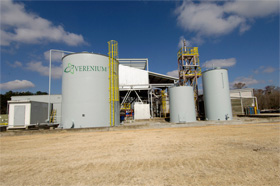 Wisconsin’s first soybean crushing facility is being built… thanks to a $4 million grant from the state.
Wisconsin’s first soybean crushing facility is being built… thanks to a $4 million grant from the state.
Gov. Jim Doyle handed out the money to farmer-owned Landmark Services Cooperative, which has plans to process 20 million bushels of soybeans each year at the plant:
“The soybeans Wisconsin grows so well will stay here in the state, get processed in Evansville and may end up fueling the tractors along these roads,” Governor Doyle said. “This facility offers us a way to create jobs, free us from big oil companies and advance our commitment to renewable energy.”
A soybean crushing facility separates soybean oil from the rest of the bean, which can then be processed into bio-diesel. Currently, most of the state’s soybean crop is processed in other states and sold back to Wisconsin farmers for feed. Last year the state’s first large-scale commercial biodiesel plant opened in DeForest with the capacity of producing 20 million gallons of biodiesel annually from a variety of feedstock sources, including soybean oil.
Despite Wisconsin being one of the nation’s leader in soybean and renewable fuel production, it did not have a soybean crushing facility.


 A ferry carrying 124 cars in Washington State’s Puget Sound has been running on biodiesel since last month, and officials are hoping to expand the green fuel into another transport.
A ferry carrying 124 cars in Washington State’s Puget Sound has been running on biodiesel since last month, and officials are hoping to expand the green fuel into another transport. Fifty years ago, you could see acres and acres of flax growing in the southern part of Texas. Today, the crop once grown for vegetable oil, is finding new life as a feedstock for biodiesel.
Fifty years ago, you could see acres and acres of flax growing in the southern part of Texas. Today, the crop once grown for vegetable oil, is finding new life as a feedstock for biodiesel. “It’s kind of like we’re coming full circle,” said Dr. Gaylon Morgan, small grains researcher and member of the Texas A&M AgriLife project team. “Flax was grown on about 400,000 acres during that time and Texas AgriLife Research had an active flax breeding program.
“It’s kind of like we’re coming full circle,” said Dr. Gaylon Morgan, small grains researcher and member of the Texas A&M AgriLife project team. “Flax was grown on about 400,000 acres during that time and Texas AgriLife Research had an active flax breeding program. “Schools, truck drivers, small businesses and families across the commonwealth are feeling the pressure of higher fuel bills on their budgets and wallets,” said McGinty. “Switching from conventional fuels to homegrown biofuels will help break our addiction to foreign oil, bring down costs, strengthen national security, and grow our economy.
“Schools, truck drivers, small businesses and families across the commonwealth are feeling the pressure of higher fuel bills on their budgets and wallets,” said McGinty. “Switching from conventional fuels to homegrown biofuels will help break our addiction to foreign oil, bring down costs, strengthen national security, and grow our economy. Roe explains that Coskata combines both biological and thermochemical processing and can use a wide variety of feedstocks, from wood chips, weeds and non-food crops like miscanthus, to even human waste and carbon-heavy garbage like tires.
Roe explains that Coskata combines both biological and thermochemical processing and can use a wide variety of feedstocks, from wood chips, weeds and non-food crops like miscanthus, to even human waste and carbon-heavy garbage like tires. Sales of alternative fuel vehicles in the United States, including flex-fuel and hybrid electric, reached 1.8 million last year, about 250,000 more than in 2006.
Sales of alternative fuel vehicles in the United States, including flex-fuel and hybrid electric, reached 1.8 million last year, about 250,000 more than in 2006.
 According to officials, the site has been electronically energized and the turnover of individual systems to start-up and operating teams has begun so that the functional capabilities of each system can be tested. In total, more than forty separate systems will be evaluated over approximately the next three months.
According to officials, the site has been electronically energized and the turnover of individual systems to start-up and operating teams has begun so that the functional capabilities of each system can be tested. In total, more than forty separate systems will be evaluated over approximately the next three months. Spirits were high for driver Ryan Hunter-Reay at the start of the race where he had qualified for sixth pole position. After ten laps behind the pace car in the rain, the field opened up and Hunter-Reay spun out, dropping him down to 23rd.
Spirits were high for driver Ryan Hunter-Reay at the start of the race where he had qualified for sixth pole position. After ten laps behind the pace car in the rain, the field opened up and Hunter-Reay spun out, dropping him down to 23rd.  Drivers Oliver Gavin and Olivier Beretta won their second consecutive class victory on the waterfront street circuit in St. Petersburg, Florida.
Drivers Oliver Gavin and Olivier Beretta won their second consecutive class victory on the waterfront street circuit in St. Petersburg, Florida.